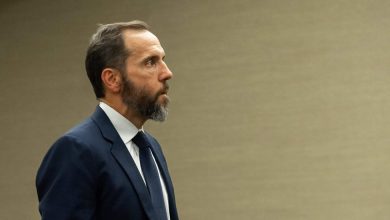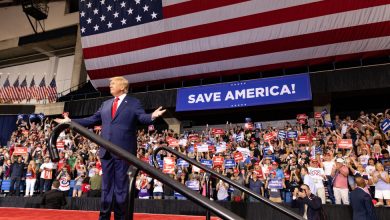Ohio Senate Race Pits Trump and Son Against Big G.O.P. Group

Not long after Donald J. Trump was elected president, the Club for Growth, a conservative anti-tax group that had opposed his 2016 campaign, reinvented itself as a reliable supporter, with the group’s president, David McIntosh, providing frequent counsel to Mr. Trump on important races nationwide.
But this spring, as Mr. Trump faces critical tests of the power of his endorsements, an ugly fight over the Ohio Senate primary is threatening what had been a significant alliance with one of the most influential groups in the country.
The dispute broke into plain view days ago when in support of Josh Mandel, the former Ohio state treasurer, for the Republican Senate race, the Club for Growth ran a television commercial showing the candidate Mr. Trump has endorsed, the “Hillbilly Elegy” author J.D. Vance, repeatedly denouncing Mr. Trump in 2016.
Mr. Trump’s response was brutish: He had an assistant send Mr. McIntosh a short text message telling him off in the most vulgar terms. The group, one of the few that actually spends heavily in primary races, responded by saying it would increase its spending on the ad.
That escalation drew an angry response from Donald Trump Jr., the former president’s eldest son, who had spent months urging his father to support Mr. Vance and has invested his own energy and influence on Mr. Vance’s behalf.
The standoff over the Ohio primary encapsulates some of the critical open questions within the Republican Party. Mr. Trump has held enormous sway despite being less visible since leaving office, but other power centers and G.O.P.-aligned groups over which he used to exert a stranglehold are asserting themselves more. And his ability to influence the thinking of Republican voters on behalf of other candidates is about to be tested at the ballot box.
Until now, even after the Jan. 6, 2021, riot at the Capitol by Trump supporters seeking to keep him in office, many Republican candidates have fallen over themselves to court Mr. Trump’s endorsement. That’s proven especially true in Ohio, where the primary for the Senate has been dominated by candidates like Mr. Mandel and Mr. Vance, who have emulated Mr. Trump’s reactionary politics.
How Donald J. Trump Still Looms
- Grip on G.O.P.: Mr. Trump remains the most powerful figure in the Republican Party. However, there are signs his control is loosening.
- A Modern-Day Party Boss: Hoarding cash, doling out favors and seeking to crush rivals, Mr. Trump is behaving like the head of a 19th-century political machine.
- Power Struggle: Led by Senator Mitch McConnell, a band of anti-Trump Republicans is maneuvering to thwart the ex-president.
- Post-Presidency Profits: Mr. Trump is melding business with politics, capitalizing for personal gain.
- Just the Beginning: For many Trump supporters who marched on Jan. 6, the day was not a disgraced insurrection but the start of a movement.
The Ohio contest has also divided Mr. Trump’s own circle, as rival candidates have hired various formal and informal advisers to the former president in hopes of influencing his eventual endorsement.
Much like Mr. Vance, Mr. McIntosh and the Club for Growth opposed Mr. Trump in 2016, but the group then recast itself as closely aligned with him.
By the time Mr. Trump left office, Mr. McIntosh was frequently speaking with him by phone and visiting him at Mar-a-Lago, Mr. Trump’s private club in Florida, according to an aide to Mr. McIntosh. His frequent attempts to sway Mr. Trump’s thinking on politics reached the point that it rankled others in Mr. Trump’s circle, which is constantly in flux and populated by people seeking influence.
In a brief interview after receiving the text message from Mr. Trump’s aide last week, Mr. McIntosh minimized the dispute over Ohio, noting that the former president and the Club for Growth had both endorsed Representative Ted Budd, a Republican in North Carolina running for the Senate, a race on which the group has spent heavily.
“I very much view this as one race where we’re not aligned, we’re on opposite sides, which doesn’t happen very often,” Mr. McIntosh said of the clash over Ohio.
Still, the Club for Growth also stuck with Representative Mo Brooks in Alabama’s Senate primary after Mr. Trump withdrew his own endorsement.
The dispute over the group’s attack on Mr. Vance touched a nerve with both Mr. Trump and his eldest son.
The former president has long taken special delight in bringing to heel Republicans who, having criticized him, are forced to acknowledge his supremacy in the party and bow and scrape for his approval. That was the case with Mr. McIntosh, and also with Mr. Vance, who courted the former president with the help of the Fox News host Tucker Carlson and the billionaire Peter Thiel, as well as that of Donald Trump Jr.
All of which explains why the Club for Growth’s ad showing Mr. Vance expressing scorn for Mr. Trump in 2016 aggravated not only the former president, but also his son.
The younger Mr. Trump, who is trying to flex his own political muscle within the Republican Party, treated the tiff between his father and Mr. McIntosh as an opening to attack the group and also to try to tear down Mr. Mandel.
When he visited Ohio this week on Mr. Vance’s behalf, the younger Mr. Trump attacked Mr. Mandel by name for his support for a no-fly zone in Ukraine, and also criticized the Club for Growth, saying, “They spent $10 million in 2016 to fight Donald Trump,” and suggesting the group was “soft on China.”
The younger Mr. Trump also said he might oppose candidates newly endorsed by the Club for Growth unless it stops running the ads about Mr. Vance and removes Mr. McIntosh from the group’s board, according to an adviser who spoke anonymously.
Liam Donovan, a Republican strategist and former top aide at the National Republican Senatorial Committee, said that while Mr. Trump’s approach with his endorsements has been fairly random in recent months, the Vance endorsement is different because of the composition of the primary. “This is the first time Trump’s political might has been tested on a level playing field among broadly acceptable candidates,” Mr. Donovan said.
In both Ohio and North Carolina, Mr. Donovan said, “the Trump nod may lift his picks from the middle of the pack to victory over established favorites with lengthy statewide resumes. That would be an objectively impressive display of power.”
Mr. Trump’s backing has elevated Mr. Vance’s standing in the primary, according to a Fox News survey released on Tuesday evening. Mr. Vance received 23 percent of the primary vote, an increase of 12 percentage points from the last survey, overtaking Mr. Mandel, who received 18 percent. Some 25 percent of voters remain undecided, the poll found.
Mr. Trump had been advised that he could have the most effect by giving his endorsement in mid-April, as early voting was set to begin in the state.
There is always the chance that the Club for Growth emerges successful in the fight in Ohio. Mr. McIntosh said he believed that Mr. Mandel was the most conservative, pro-Trump candidate in the field.
Still, Republican strategists said a late surge by Mr. Vance, even if he does not win, would give Mr. Trump renewed bragging rights.
David Kochel, a Republican strategist who has advised past presidential nominees, said that Mr. Trump appears “to have breathed life into a campaign most people assumed was dead,” adding, “even if Vance loses, Trump will be able to argue that he turned his campaign around.”





